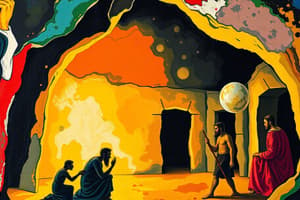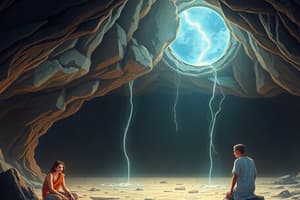Podcast
Questions and Answers
What does the cave symbolize in Plato's Allegory of the Cave?
What does the cave symbolize in Plato's Allegory of the Cave?
- The world where we are confined by ignorance and prejudice (correct)
- A place for philosophical discussion and debate
- The outside world filled with light and truth
- A dark, enclosed space for prisoners to meditate
In the Allegory of the Cave, what do the shadows on the wall represent?
In the Allegory of the Cave, what do the shadows on the wall represent?
- Philosophical enlightenment
- Misconceptions due to limited perception (correct)
- Direct interaction with reality
- Freedom from ignorance
Who do the prisoners represent in Plato's Allegory of the Cave?
Who do the prisoners represent in Plato's Allegory of the Cave?
- Individuals trapped in ignorance and a limited perspective (correct)
- Philosophers seeking truth
- Observers of the puppet show
- Captives of a physical prison
What does the fire in the cave that casts shadows symbolize in Plato's Allegory?
What does the fire in the cave that casts shadows symbolize in Plato's Allegory?
What happens when a prisoner is freed and exits the cave in Plato's Allegory?
What happens when a prisoner is freed and exits the cave in Plato's Allegory?
According to Plato's Allegory of the Cave, what is the ultimate quest for humanity?
According to Plato's Allegory of the Cave, what is the ultimate quest for humanity?
What is the central message of Plato's Allegory of the Cave?
What is the central message of Plato's Allegory of the Cave?
In the Allegory of the Cave, what does the sunlight symbolize?
In the Allegory of the Cave, what does the sunlight symbolize?
What challenges does the liberated prisoner face after leaving the cave?
What challenges does the liberated prisoner face after leaving the cave?
What concept does the Allegory of the Cave emphasize regarding philosophical inquiry?
What concept does the Allegory of the Cave emphasize regarding philosophical inquiry?
How does Plato compare a philosopher's quest for wisdom to the prisoner's journey out of the cave?
How does Plato compare a philosopher's quest for wisdom to the prisoner's journey out of the cave?
What risk does a philosopher face, according to Plato's Allegory of the Cave?
What risk does a philosopher face, according to Plato's Allegory of the Cave?
Flashcards are hidden until you start studying
Study Notes
Plato's Allegory of the Cave
In the heart of ancient Greek philosophical thought, Plato's Republic delivers a captivating parable known as the "Allegory of the Cave," a metaphorical tale that encourages us to question the nature of reality and the human quest for knowledge. This allegory can be broken down into its four main components: the cave, the prisoners, the shadows, and the journey to reality.
The Cave
The setting of the Allegory is a cavern, a dark, enclosed space where captives are chained facing a back wall. This cave symbolizes our world, a place where we often remain confined by our ignorance and prejudice.
The Prisoners
The individuals shackled in the cave represent humanity, habitually trapped in ignorance and a limited perspective of existence. They have grown accustomed to their confined environment, and in time, they have forgotten that there is an outside world, unaware of their own captivity.
The Shadows
The only light in the cave emanates from a fire, casting shadows of puppets on the wall opposite the prisoners. These shadows represent our understanding of reality, which is inherently misshaped due to our limited perception and lack of direct interaction with the true nature of things.
Reality
The philosophical climax of the Allegory occurs when one of the prisoners, having been freed from their chains, exits the cave and encounters reality outside. This individual realizes that the shadows they had perceived as reality are simply an incomplete representation of the real world, and they begin to appreciate the complexity and brilliance of true existence.
Journey to Reality
The journey to reality, initiated by the liberated prisoner, is a metaphorical representation of the philosopher's pursuit of knowledge and truth. Plato proposes that, like the prisoner who gradually adjusts to the light and gains a clearer understanding of the world, a philosopher's quest for wisdom entails a continual process of learning and unlearning, of climbing out of the cave and viewing reality in its full splendor.
However, the journey is not without its challenges, as the Allegory points out. The liberated prisoner may be stunned by the brightness of the sunlight and initially struggle to perceive the true nature of the world. Similarly, a philosopher's pursuit of wisdom is not always straightforward and may be impeded by their own ignorance, society's prejudice, and the ever-present risk of slipping back into the cave of complacency.
The Allegory's Enduring Influence
Plato's Allegory of the Cave continues to shape the philosophical landscape and has inspired countless thinkers, writers, and artists. Its central message, that reality is not what it appears to be, is a powerful reminder that our perception of the world is often distorted by our own biases and assumptions. Furthermore, the Allegory highlights the importance of philosophical inquiry and the pursuit of truth, while emphasizing the necessity of continuous learning and the risk of remaining trapped in ignorance.
Studying That Suits You
Use AI to generate personalized quizzes and flashcards to suit your learning preferences.




